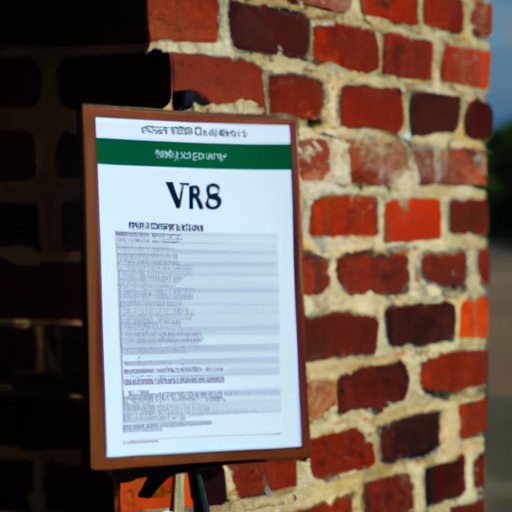Introduction
A financial advisor is a professional who provides advice and guidance on financial decisions and investments. They work with individuals, families, businesses, and organizations to create financial plans and strategies that meet their specific needs and goals. Becoming a financial advisor is an exciting career path that requires a combination of educational qualifications and professional experience. In this article, we’ll explore what qualifications you need to become a financial advisor.

Exploring Financial Advisor Qualifications: What it Takes to Become a Professional Financial Advisor
The qualifications needed to become a financial advisor vary depending on the type of services they provide. However, there are some basic requirements that all financial advisors must meet in order to practice professionally.
Education and Training Requirements
The first step to becoming a financial advisor is obtaining the necessary education and training. Most financial advisors have at least a bachelor’s degree in finance, accounting, economics, or another related field. Some may also go on to obtain a master’s degree or CFP (Certified Financial Planner) certification. Additionally, many financial advisors seek out additional certifications such as the Chartered Financial Analyst (CFA), Chartered Investment Counselor (CIC), or Chartered Retirement Planning Counselor (CRPC).
Professional Experience Requirements
In addition to the educational requirements, financial advisors must also gain professional experience. This can include internships or other entry-level positions in the financial services industry. Many employers prefer to hire candidates with at least three years of relevant experience.
Licensing Requirements
Financial advisors must also meet licensing requirements. Depending on the type of services they provide, they may need to obtain a Series 7, Series 65, or Series 66 license from the Financial Industry Regulatory Authority (FINRA). These licenses demonstrate that a financial advisor has the necessary knowledge and expertise to advise clients properly.

Essential Qualifications Needed to Become a Financial Advisor
In addition to meeting the educational and licensing requirements, there are several essential qualifications that are needed to become a successful financial advisor. These include:
Knowledge of Investments
Financial advisors must have a thorough understanding of investments and how they work. They must be able to analyze different investments and determine which ones are most appropriate for their clients’ needs and goals.
Understanding of Taxation
Financial advisors must also have a good understanding of taxation. They must be able to advise clients on how to minimize their tax liability and maximize their returns.
Ability to Communicate Effectively
Financial advisors must be able to communicate effectively with clients. They must be able to explain complex financial concepts in an easy-to-understand manner and provide sound advice and guidance.
Analytical and Problem-Solving Skills
Financial advisors must have strong analytical and problem-solving skills. They must be able to identify potential issues and develop solutions to address them.
Business Acumen
Financial advisors must also have a good understanding of business. They must be able to assess a client’s current situation and develop a plan to help them reach their financial goals.
Understanding of Risk Management
Financial advisors must also understand risk management. They must be able to evaluate different risks and develop strategies to mitigate them.
A Guide to the Educational and Professional Requirements for Becoming a Financial Advisor
Now that you know what qualifications are needed to become a financial advisor, you can begin the process of pursuing your dream career. Here is a guide to the steps you should take to become a financial advisor:
Researching Your Options
Before you start the process of becoming a financial advisor, it is important to research your options and find out which schools offer the best programs. Look into different universities and colleges to find the one that best fits your needs and interests.
Gaining Professional Experience
Once you have completed your education, it is important to gain professional experience. Consider taking an internship or entry-level position in the financial services industry. This will give you the opportunity to learn from experienced professionals and gain real-world experience.
Applying for Licensure
Once you have the necessary qualifications, you can apply for licensure. You will need to pass FINRA’s Series 7, Series 65, or Series 66 exam in order to become a licensed financial advisor.
Building Your Career as a Financial Advisor: What Qualifications Are Required?
Now that you know what qualifications are needed to become a financial advisor, it is time to start building your career. There are several things you can do to ensure success:
What Are the Benefits of Becoming a Financial Advisor?
Becoming a financial advisor is a rewarding career that offers many benefits. Financial advisors have the opportunity to make a difference in people’s lives by helping them achieve their financial goals. Additionally, they can enjoy job security and a competitive salary.
Working in the Field: Ongoing Learning and Professional Development
Financial advisors must stay up-to-date on the latest trends and developments in the financial services industry. They must continually expand their knowledge and hone their skills in order to remain competitive in the field.
Leveraging Technology to Enhance Your Practice
Technology plays an essential role in the financial services industry. Financial advisors must leverage technology to improve their practices and help their clients make informed decisions. They must stay abreast of the latest software, tools, and platforms available to financial advisors.
Conclusion
Becoming a financial advisor is an exciting and rewarding career path that requires a combination of educational qualifications and professional experience. To become a financial advisor, you must possess the necessary knowledge of investments, taxation, communication skills, and business acumen. Additionally, you must obtain the proper licensure and gain professional experience. With the right qualifications, you can build a successful career as a financial advisor.
(Note: Is this article not meeting your expectations? Do you have knowledge or insights to share? Unlock new opportunities and expand your reach by joining our authors team. Click Registration to join us and share your expertise with our readers.)
